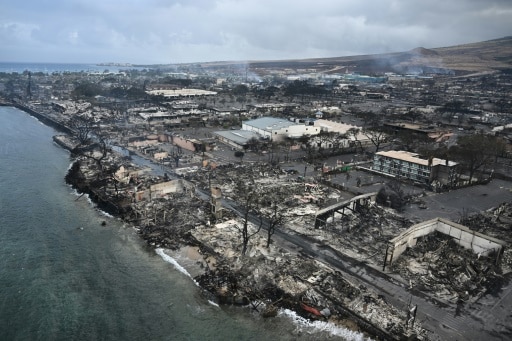Washington (AFP) – The devastating fires that ravaged cities across the United States and Canada have led to a rise in misinformation online, with the latest theory putting the finger on the supposed responsibility of networked “smart city” projects.
On the networks, Internet users claim that the fires that destroyed cities or entire districts this summer were deliberately set by the authorities to create a clean slate for the installation of these new urban technologies.
“When these two cities launched initiatives to become smart cities, what were the chances that there were two fires in two different locations in the same week? » asks a woman in a video on TikTok, referring to the fires that devastated Lahaina in Haiwai and West Kelowna in western Canada.
[À lire aussi Les météorologues, nouvelle cible de la désinformation climatique]Some of these videos examined by AFP are no longer available on TikTok, but copies are circulating on Facebook, Instagram and even X (formerly Twitter).
“There is no reason to destroy infrastructure in order to rebuild it smarter and more connected,” Harvey Miller, an urban planner at Ohio State University, told AFP.
While the Canadian city of Kelowna released a “Smart City” strategy in 2020, there is no evidence that any destruction was caused for this purpose, a claim that has been made millions of times across various platforms.
These connected city projects, particularly those promoting public transit, have a bad reputation in the United States. A 2022 poll confirmed that half of Americans don’t want to live there.
Toronto project withdrawn
Similar theories have circulated online following other disasters in North America, including Hurricane Idalia in Florida and a train derailment that caused pollution in Ohio.
In Canada, smart city projects are often accused of being motivated by the intention to restrict climate-related freedoms or eliminate cash.
Rumors that sometimes turn into reality, as in Bridgewater, a small town in eastern Canada that became the target of a series of false accusations after participating in a “smart city” competition.
In particular, Internet users assured that the project would restrict the freedom of movement of residents, the mayor told AFP – while the project was about thermal renovation of buildings and improving public transport – which caused fears among the population.
But beyond the absurd theories, these urban development projects raise legitimate debates, continues researcher Harvey Miller, particularly about privacy.
“With high-resolution cameras you can’t survey a city in real time without creating the ability to identify and track people,” he explains.
Google has therefore abandoned a project in Toronto, particularly because the American giant has not responded to concerns about the protection of personal data.
Andrew Smyth, a specialist on this topic at Columbia University, says he works on privacy technologies in the projects he works on in New York and Florida.
“I’m not aware of any bad intentions from the smart city movement,” he says. “There’s no real reason why these cities would want more control – they’re looking for efficiency.”
© AFP
also read
Arthur Grimonpont, author of Algocracy: “The solution almost always lies in collective action, not individual action”
Philippe Bihouix: “The truly “smart” city is the one that relies above all on the intelligence of its residents”
Scientist Olivier Hamant: “Our human performance causes exorbitant costs for the environment”

Extreme problem solver. Professional web practitioner. Devoted pop culture enthusiast. Evil tv fan.




;Composite=(type=URL,url=https://images.radio-canada.ca/v1/assets/elements/16x9/outdated-content-2021.png),gravity=SouthEast,placement=Over,location=(0,0),scale=1)


